Incredible wildlands are in jeopardy of being developed for oil, gas, and mineral extraction by the BLM – the very federal agency who manages them.
With a need to act on climate, it’s more important than ever that all of us practice civic engagement — at the local, state, and federal levels.
If you love our public lands like I do, I hope you will tell the Trump Administration they don’t own these lands, we have entrusted them with the management of OUR lands.
Just last week, Colorado’s AQCC voted to adopt a Zero Emission Vehicle standard which will bring help Coloradans breathe easier and bring more EVs to CO.
DENVER — Governor Jared Polis today announced an executive order to protect iconic Colorado wildlife and the landscapes they call home, aimed at conserving western landscapes and big game species for future generations. Gov. Polis’ order means Colorado will prioritize, coordinate and focus on protecting the traditional migration corridors of Rocky Mountain elk, mule deer, pronghorn antelope, mountain goats, bighorn sheep and moose.
Specifically, the executive order directs:
- Colorado Parks and Wildlife (CPW) to compile a status report of wildlife migration and associated science by the end of the calendar year;
- Colorado Department of Natural Resources to identify policy, regulatory or legislative opportunities to ensure the ongoing conservation of seasonal habitat and migration corridors;
- CPW to incorporate the importance of migration corridors into public education and outreach efforts; and,
- Colorado Department of Transportation to enable safe wildlife passage and reduce wildlife-vehicle collisions.
The order will remain in effect until May 1, 2023 unless modified or rescinded prior to that date.
Conservation groups released the following statements in response:
“The health of our wild spaces and wildlife are a measure of the health of our state. Governor Polis campaigned on a pledge to ‘keep Colorado wild.’ Today’s executive order is a first step in delivering on that promise to ensure that Colorado remains wild for future generations.”
– Kelly Nordini, executive director, Conservation Colorado
“Colorado’s wildlife are a key part of our state’s heritage and our outdoor way of life. This executive order will help Colorado balance our state’s rapid growth with the increasing need to safeguard our wildlife by helping to keep their habitats and corridors protected and connected. We applaud Governor Polis for taking action and look forward to continued partnership to enact this measure.”
– Rachael Hamby, Western lands policy analyst, Western Resource Advocates
“These wild places are vital for birds to thrive, taking cover in the winter and stopping over as they migrate. The protections that Governor Polis has set in motion through this Order will benefit many species and set important standards throughout the state.”
– Nada Culver, Vice President for Public Lands, National Audubon Society
“The Colorado Sierra Club applauds the Governor for taking bold action to protect wildlife and our Colorado heritage. Thanks to Governor Polis, Colorado is taking key steps to better understand and protect the historical migration pathways of the animals.”
– Jim Alexee, director, Colorado Sierra Club
“We humans share this beautiful state with the wildlife, plants, insects, and birds that are part of nature. The efforts of Governor Polis to protect the wildlife and their habitats through the designation and maintenance of wildlife corridors will enhance the quality of life for us all. These corridors will ensure that future generations will experience the rich diversity of animal life that we do.”
– Sherry Schenk, Public Lands Committee member, Western Colorado Alliance
“Colorado’s leadership in advocating for protection of wildlife corridors is more important than ever before . In southwest Colorado, the most critical wildlife corridor for lynx in the state is at risk from a massive real estate development atop Wolf Creek Pass. We look forward to working with state agencies to make the Governor’s vision a reality.”
– Mark Pearson, executive director, San Juan Citizens Alliance
###
Denver, CO – Today, following a vote by Colorado’s Air Quality Control Commissioners to adopt a statewide Zero Emission Vehicle (ZEV) standard, organizations and businesses working to save energy, cut carbon and clean the air we breathe, lauded the vote and what a ZEV standard means for the future of Colorado.
The new ZEV standard will reduce harmful tailpipe pollution, protect our health and climate, and save Coloradans money. By requiring auto makers to build and deliver an increasing number of electric (or zero emission) vehicles to Colorado, the standard will increase the availability of new electric vehicle models and help accelerate the clean vehicle market in the state. The Colorado Department of Public Health and Environment estimated that the rule will prevent more than 3 million tons of climate pollution while saving Coloradans more than a billion dollars through 2030.
Colorado is the first state in a decade, and the 11th state overall, to adopt the ZEV standard. Governor Polis issued an executive order in January directing the Air Quality Control Commission to consider taking this step. Today’s vote concludes the process.
“Increased adoption of electric vehicles is a win for clean air, climate action, and our Colorado way of life,” said Kelly Nordini, executive director of Conservation Colorado. “Today’s vote means Coloradans will have many more choices for electric vehicles and moves Colorado closer to reclaiming our title as a conservation leader for the West and the nation.”
“Colorado is plugging into electric vehicles in a big way,” said Travis Madsen, Transportation Program Director at the Southwest Energy Efficiency Project. “It’s a smart choice. We will save billions of dollars while cleaning our air and protecting our climate. We look forward to working with automakers — who supported Colorado’s adoption of this standard — to accelerate electric transportation in additional states.”
“Today’s vote to adopt the ZEV program is a big step towards reducing transportation pollution for Coloradans across the state, which is a triple win for our health, our climate, and our wallets. We applaud the AQCC and Governor Polis for making Colorado the first Mountain West state to adopt a ZEV program,” said Emily Gedeon, the Conservation Program Director of the Colorado Sierra Club. “We are closely tracking the automakers’ agreement to make sure that it doesn’t slow down progress on bringing electric vehicles to our smoggy state. Our communities deserve mobility options that don’t pollute the places we live and play in. Automakers must now deliver on their support for clean cars and uphold their promise to support the authority of Colorado and any other state to adopt a ZEV program.”
“Unhealthy air days are all too common and completely unacceptable. By adopting the Zero Emission Vehicle program we are taking big steps to cut air pollution from the tailpipes of vehicles and quicken our transition to a cleaner, electric-powered transportation system.” – Danny Katz, Director at CoPIRG (Colorado Public Interest Research Group).
“As the Trump administration moves to roll back federal clean car standards, Colorado’s adoption of a ZEV standard is an essential step forward.” said Simon Mui, Deputy Director of the Clean Vehicles and Fuels Group at the Natural Resources Defense Council. “Colorado and other states must step up to reduce carbon emissions that threaten public health and contribute to climate change. That’s why we’ll continue working at the state level to make clean cars accessible and affordable, in Colorado and beyond.”
“With today’s vote, Colorado joins the growing coalition of states positioned to reap the public health and economic benefits of the rapid transition to a cleaner transportation sector with zero-emitting vehicles. That automakers for the first time expressly support Colorado’s adoption of the ZEV program is further evidence of this transition. Coloradans will see cost savings at the pump, cleaner air, and a safer climate. EDF applauds the move and looks forward to continued progress to ensure Colorado meets its climate goals.” – Alice Henderson, Attorney, Environmental Defense Fund
“Colorado’s economic future will be driven by the clean energy economy with today’s vote, “ said Susan Nedell, Mountain West Advocate for E2 (Environmental Entrepreneurs). “Adopting a ZEV standard launches the state into a top destination for new cleantech investment and expansion while saving Coloradans on fuel and maintenance, protecting the state’s vital outdoor recreation and tourism industries, and creating thousands of new jobs across energy storage and clean vehicles.”
###
Contacts:
Garrett Garner-Wells, Conservation Colorado, 303-605-3483, garrett@conservationco.org
Travis Madsen, Southwest Energy Efficiency Project, 720-937-2609, tmadsen@swenergy.org
Emily Gedeon, Sierra Club, emily.gedeon@sierraclub.org, 720-308-6055
Nadia Perl, Natural Resources Defense Council, 510-928-1717, nperl@nrdc.org
Through education, leadership development, and skill-building, Protégete is working to fight injustices by supporting youth in becoming the next generation of community advocates and environmental leaders.
The impacts of climate change, pollution, and rapid population growth put serious strains on Colorado’s water supply and our many water-dependent industries, which includes Colorado’s booming craft beer scene.
Written by: Sara Penilla Montoya, Promotora and Protégete Intern
Too often, the youngest members of our society are left without a seat at the decision-making table.
We’ve been told that we are “too young,” “not educated enough,” or “not mature enough” to understand the issues that we see everyday in our schools, our neighborhoods, and our homes. We’re discouraged from actively engaging in our communities, stifling our collective voice and the positive changes that we want to make to improve our future.
That still hasn’t stopped today’s generation from standing up together, raising our voices, and declaring how significant it is to be a part of change.
The environmental movement is the perfect example to show how children, teens, and youth — the people that will wrestle with climate impacts for generations to come — are stepping up to defend their future. The conservation movement poses an immense opportunity for young people, especially for people from frontline communities, to express the need for powerful climate leadership — and that’s why I was so excited to attend the Rising Leaders training in Washington, DC.
At the League of Conservation Voters training, students from all over the country learned more about the most pressing environmental issues affecting our communities and how storytelling can be a tool to lobby decision-makers at the state and federal levels.
Four students from the Protégete team experienced firsthand the importance and power our personal stories hold as we lobbied with members of Congress from Colorado. For some students, the trip was their first visit to our country’s capital.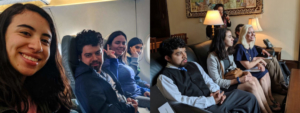
We took the chance to talk to elected officials about the issues that are not only impacting our lives, but the livelihoods of millions of Americans. The stories shared a common message: it’s time for climate action, for us, our environment, and future generations.
Xioana, 16: Protecting Future Generations
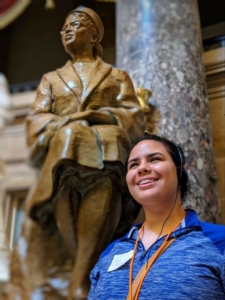
Xioana stands with a statue of Rosa Parks, the only statue of a woman of color in the Capitol.
“When I was 13 years old, my family and I made the move from Caracas, Venezuela, to Denver, Colorado. My country has historically been lauded the most prosperous in South America; we had a booming economy that enticed immigration from around the world, and we welcomed everyone. That is, until political corruption changed everything.
My family saw firsthand how economic unrest had unimaginable ramifications on every aspect of peoples’ lives, including great environmental justice implications. My grandfather not only struggled for financial stability, but for access to water. He can barely afford to take just a few showers a year, due to drought exacerbated by climate change.
I remember my first day of school [in the United States]. I was walking through the hallways, fascinated by the fact that I had a locker, that breakfast was free, and that people gave away pencils. I realized that the opportunities I craved for so long were finally within my reach.
Too often, we waste our potential and decrease our value in the eyes of society; but the beauty of our ephemeral existence is that if we realize it soon enough, we can learn to appreciate the little things.
I come from a place where corruption is abundant while food, water, and electricity are insufficient. While spending thirteen years of my life in this place, I never realized how much I was being deprived, because it is easy to be satisfied with what you have when you have never known any better. In my young eyes, America’s only great value was that it snowed every now and then. I never imagined this to be the place of freedom and opportunities. The place that I come from is falling apart as I write this and losing its values as you read it. The reality is that while some people can escape this fate, others cannot. I was one of the lucky ones.
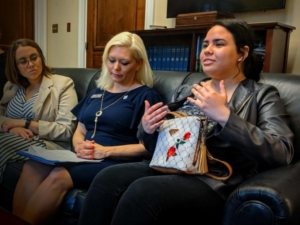
Xioana shares her story with Congresswoman Diana DeGette.
Since moving to Thornton, I have felt very fortunate that these difficulties are not an everyday reality for me and my mother. It’s why I want to join the Air Force when I graduate high school; I love this country, it’s my home and I want to keep it safe. But I need my politicians to keep me safe, too. I live right on the outskirts of Commerce City, a municipality that is known for its high concentration of industries and hardworking communities of color. These factories, including a refinery located a mere five miles from my house, cause profound health impacts on the children growing up near them.
I went to Washington D.C. to tell our members of Congress that I am the future of this country and they need to protect me.”
I am young, an immigrant, Latina, and powerful. I am the face of the United States, and I believe everyone deserves a healthy environment.
Eunice, 16: Working Together to Stop Climate Change
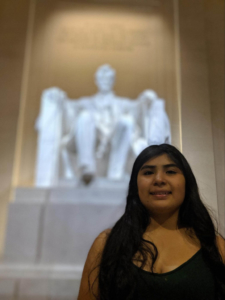
Eunice at the Lincoln Memorial.
“This past year, I’ve been a part of the Leadership Development class at The New America School in Thornton. My teacher, Zoraida Martinez, partnered with Protégete to teach us about environmental justice and civic engagement. We learned about how the impacts of climate change are made worse because of the waste that we create — a lot of which could be diverted by recycling or composting.
For example, when we throw plastic into the garbage, it can end up as harmful pollution in the ocean or contaminating the water and soil of our communities. Because plastic can’t biodegrade, it sits in landfills and contaminate the places where we live. That is why it is so important for everyone to do their part in protecting our planet.
I had never gotten involved in politics before; as an immigrant from Mexico, I didn’t think it was my place. But Ms. Martinez and Protégete helped me realize how powerful my classmates and I are.
And we were heard! I felt like I was putting my grain of sand in solving this huge problem, but I can’t do this alone.
That is why I went to DC to ask our federal representatives to hold polluting industries accountable. It is imperative for the government and factories to work together with regular people, like me, to stop climate change and keep Mother Earth safe.”
Eric, 22: An Exchange of Ideas
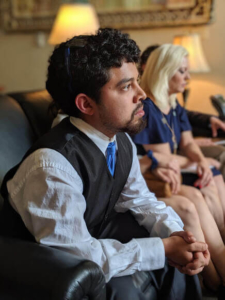
Eric in Senator Michael Bennet’s office, building a connection over attending the same school as Bennet’s daughter.
“Participating in the Rising Leaders training was a great experience. I had never been to Washington, D.C. before, and there were so many different things I was able to learn from that place, from how city infrastructure can impact our communities and our climate, to how important our stories truly are.
We frequently used public transportation (which I realized was cheaper and more efficient than our system in Denver) and discussed how communities and air quality can benefit from more public transit options.
The opportunity to learn about how important our voices are — and how we can use our stories to lobby our elected officials — was eye-opening. While I had visited the state Capitol in Colorado before, I didn’t fully understand the importance of personal stories and how they can illuminate why work needs to be done for everyone to live in an equitable world.
When we can tie these issues to ourselves — to real people, and even those who we are lobbying to — we better understand the gravity of the situation and know that we really do need to make changes.”
Our voices are what is going to shape how we solve the issues affecting us today. We shouldn’t be afraid to use our power to tell our elected officials to help us implement changes now.
Sara, 19: A Passion for the Future
“My passion for the environment is something that I have carried with me since I migrated to the United States from Colombia. It led me to a path of being what most people would call an “environmentalist:” recycling every piece of plastic and paper, turning off the lights in every room when they were not being used.
When I turned 15, I started volunteering with Protégete and learned that being an environmentalist meant so much more. I became aware of the environmental conditions in my community and those surrounding it were not what they needed to be: clean, healthy, and accessible. Such is the case for most communities of color and lower-income communities around our country. We have an obligation to these communities and others who are most impacted by environmental degradation to take care of our planet.

Sara sits outside Senator Bennet’s office.
The Rising Leaders and lobbying experience was extremely empowering. It constantly feels as if my community’s voice isn’t considered or heard when it comes to issues directly affecting us. But when I visited my elected officials to tell them why I am so passionate about these issues and what actions they can take to support my community, I was reminded how strong my community’s voice is.”
Although some of us can’t go to DC to lobby every day, we still have the power to make a change for the better. I hope that with this experience, I can motivate other young people to speak up so we can use our voices together to continue to tell our elected officials to take action to save our environment and people.
Taking part in this trip, including its trainings, and lobbying helped us realize that our voice is as strong as it could ever be, no matter how old we are or what limitations others impose on us. We can make a change in this world and we are the leaders of today. Encouraging the youth to be engaged in the issues that affect our community is essential, so just like us, they realize the importance their voice holds, and the power they have to advocate for themselves, and everyone else being silenced.
If you were inspired by our stories or if you would like to learn more about Protégete and Promotorxs programs, please click here or contact Patricia Ferrero at patricia@conservationco.org.
GRAND JUNCTION, COLORADO — Today, the Department of the Interior officially announced that it plans to relocate the Bureau of Land Management headquarters to Grand Junction.
In response, Erin Riccio, Western Slope field organizer with Conservation Colorado, released the following statement:
“It’s no surprise the Bureau of Land Management wants to relocate to Grand Junction. With a fantastic quality of life supported by our stunning public lands, the location is a no-brainer.
“We’re among the many residents in Grand Junction who are excited about this news that will benefit the local economy and bring employees closer to some of the lands they manage. However, moving the BLM headquarters to Grand Junction won’t actually protect our treasured landscapes as long as the Trump administration’s ‘energy dominance’ agenda is in place. At every opportunity, this administration and its supporters have gutted public input processes and dodged transparency requirements, even going so far as to allow drilling permits during January’s government shutdown.
“It is also worth noting that Senator Cory Gardner, who took credit for this move, continues to serve as a cheerleader for President Trump’s anti-conservation agenda. He voted time and time again to cut West Slope residents and Coloradans out of land management decisions, open treasured landscapes to drilling, and remains the only Colorado Senator to never sponsor a Colorado wilderness bill.
“We’re excited that the BLM is coming to Grand Junction. But regardless of where the BLM calls home, Coloradans want a fair public process with a more comprehensive lands management focus than the ‘energy dominance’ agenda of the Trump administration and Senator Gardner.”
###
SUPPORT OUR WORK
Join Us
Our community of members are the driving force behind environmental wins from your backyard to the state Capitol.



